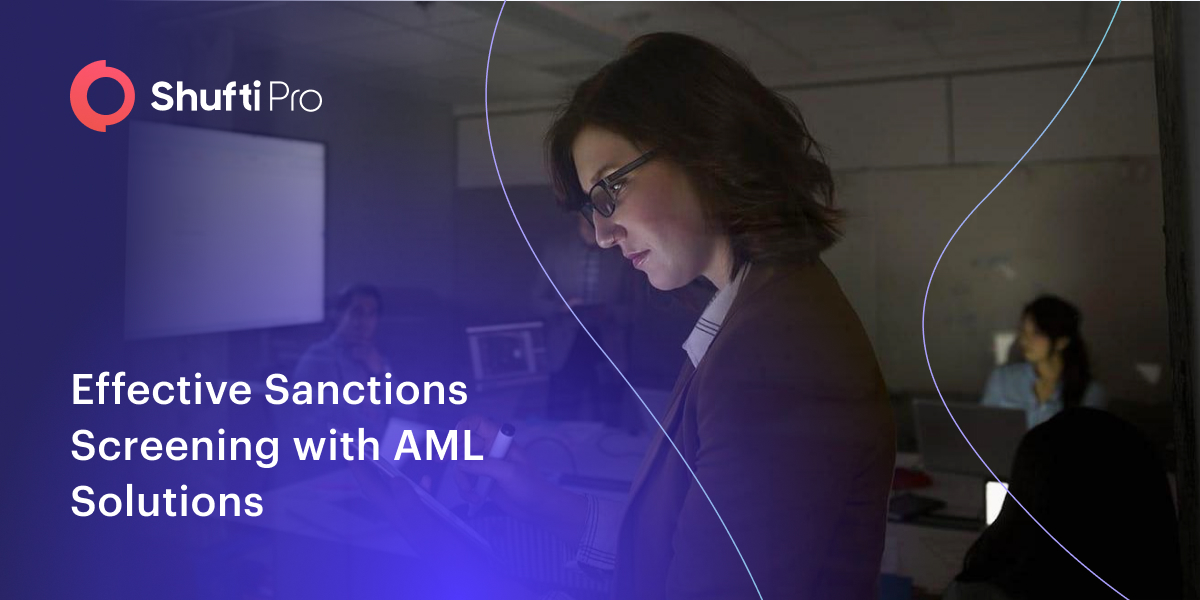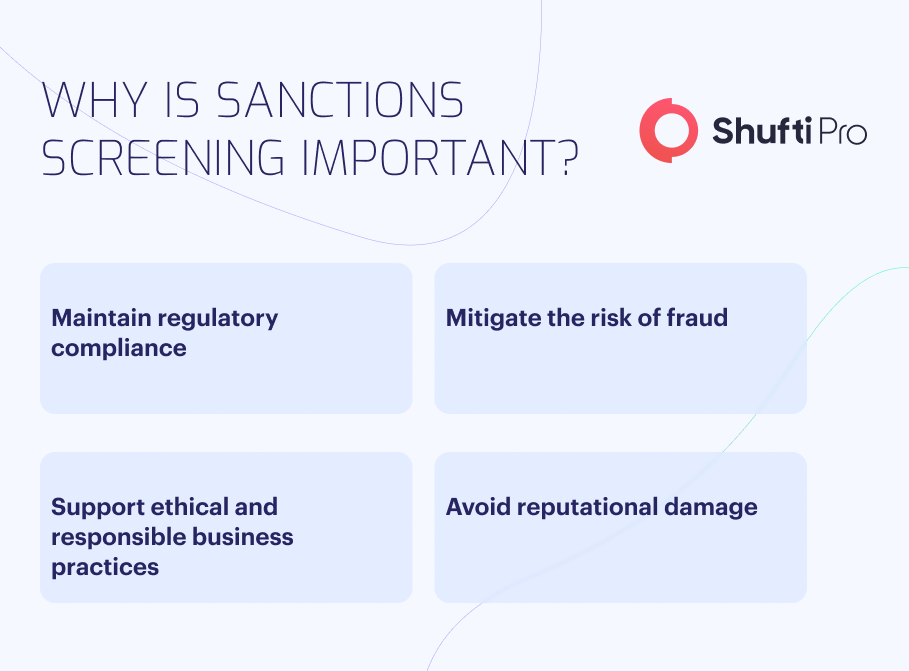Effective Sanctions Screening | A Guide for Compliance Professionals

- 01 What is Sanctions Screening?
- 02 Major Sanctions Lists Across the Globe
- 03 Why is Sanctions Screening Important?
- 04 Challenges of Conventional Sanctions Screening
- 05 The Benefits of Using Automated Sanctions Screening Processes
- 06 Things to Consider Before Investing in Automated Sanctions Screening Solutions
- 07 How Can Shufti Help?
Sanctions are crucial in combating financial crimes and maintaining national and international security. Firms doing business with sanctioned entities face substantial fines. The US Federal Reserve and Treasury charged Wells Fargo bank $97.8M for breaching US sanctions regulations. After two months, crypto firm Poloniex agreed to pay $7.6 million for violating 66k sanctions. Financial consequences are not only the concern, but global investors avoid doing business with firms that do not fulfil their corporate social responsibility. This highlights how important it is to deploy Anti-Money Laundering (AML) screening solutions to maintain regulatory compliance and avoid heavy penalties.
What is Sanctions Screening?
Sanctions screening is the process of checking whether an entity or individual appears on the sanctions list or watchlist. Such lists are compiled by governments and approved by international organisations to identify entities or individuals on sanctions lists due to the illicit activities they are involved in. Screening against these lists mitigates the risk of financial crimes and protects a business’s reputation in this age of widespread digitisation.
Major Sanctions Lists Across the Globe
- The Office of Foreign Assets Control (OFAC) Sanction List: It is maintained by the US Department of Treasury and includes individuals, organisations, and countries subject to various sanctions under US laws and regulations.
- The United Nations (UN) Sanction List: The list is maintained by the United Nations and includes individuals, firms, and countries subject to sanctions under the UN Charter.
- The European Union (EU) Sanction List: The European Union maintains a list of individuals, businesses, and countries subject to different sanctions under EU laws.
- The UK Sanction List: The government of the UK maintains its list of individuals, firms, and countries subject to several sanctions under UK regulations.
- The Australian Sanction List: The government of Australia maintains this list, which includes individuals, companies, and countries subject to different sanctions under Australian law.
- The Swiss Sanction List: The list is maintained by the Swiss government and includes individuals, firms, and countries subject to sanctions under Swiss regulations
These lists are changing continuously as new sanctions are being imposed. Thus, businesses must regularly screen their clients, partners, and transactions against these lists to maintain regulatory compliance and avoid reputational damage.
Why is Sanctions Screening Important?
- Maintain Sanction Compliance: Sanctions check helps businesses comply with the ever-changing regulations and protect themselves from heavy fines.
- Mitigate the Risk of Fraud: Individuals or organisations appearing on the sanction lists pose a great risk. Thus, businesses must perform sanction screening to mitigate the risk of financial crimes such as money laundering.
Suggested Read: April 2023 Recap: Major AML Fines and Key Events
- Support Ethical and Responsible Business Practices: Businesses have an ethical responsibility to themselves and their stakeholders to prevent criminals from using their premises to launder illegally acquired money. Thus, sanctions screening supports every business’s ethical and responsible practices.
Avoid Reputational Damage: Facing a sanctions penalty causes severe reputational damage to a business. Thus, financial sanctions screening is crucial to boost a company’s security, prevent it from non-compliance fines, and maintain its credibility in the market.

Challenges of Conventional Sanctions Screening
Sanctions screening was one of the top challenges many Financial Institutions (FIUs) faced in 2022. They were required to keep up with the evolving sanction screening regulations. However, the challenges are more pronounced in traditional sanction screening methods as they need manual efforts to analyse flagged alerts.
Here are the main pain points that a traditional financial crime screening solution faces:
- False Positives: One of the significant challenges faced by conventional sanctions screening solutions is that they generate many false positives. This wrongly flags legitimate transactions as potential matches to sanctioned entities or individuals. Thus, extensive manual reviews are required that require time and effort, impacting teh business’s operational efficiency.
- Lack of Real-Time Updates: Another challenge traditional sanctions screening solutions face is the need for real-time updates. Legacy databases may reflect new sanctions quickly, leading to delayed processing and greater risk whilst dealing with newly sanctioned parties.
- Complex Entity Matching: Cross-checking entities across name variations, spelling differences, and languages accurately poses a significant challenge. However, conventional screening solutions struggle to correctly detect variations of names, resulting in missed matches or even false negatives.
- Risk Assessment: Conventional screening methods do not accurately assess the risk level associated with flagged transactions. This causes “under-blocking” or “over-blocking”, where ow-risk transactions are delayed, or high-risk transactions are overlooked.
- Scalability: With the increasing volume of transactions, traditional screening systems struggle to handle the workload efficiently. Such scalability challenges can cause delays in processing and other potential compliance risks.
- User Experience: Manual reviews and delays caused by false positives can badly impact the user experience. Clients may face transaction delays taht result in frustration and loss of business.
The Benefits of Using Automated Sanctions Screening Processes
Automated sanction screening helps businesses improve their compliance efforts and minimise the risk of engaging in business relationships with sanctioned entities. The AML sanctions screening solution scans different data sources, including transaction details, client records, and watchlists maintained by government bodies and global organisations. When the system finds a potential match, it generates an alert so that the case should be further investigated by compliance professionals.
Automated sanctions screening helps organisations:
- Perform sanctions screening proactively
- Simplify the firms’ compliance processes
- Minimise manual efforts as well as operational costs
- Ensure AML compliance
- Enhance accuracy by reducing human errors
- Ensure real-time sanctions screening procedures
- Structure data and minimise the risk of false positives using machine learning algorithms that learn to prioritise and categorise data based on relevancy to specific alert types
- Cope with large volumes of transactions and scale as per demand
Compliance professionals can use automated sanctions screening solutions to ensure customer due diligence is performed on all associated parties and counterparties. Machine learning helps the solution learn from previous records, mitigating the risk of future errors after an accidental violation has occurred.
Things to Consider Before Investing in Automated Sanctions Screening Solutions
Businesses considering choosing the best sanctions screening solution or upgrading their existing programmes should consider the following points:
- How easy will it integrate into the company’s existing systems?
- Will a new training programme be required for compliance teams?
- What are the pain points and opportunities of the previous sanctions screening processes?
- Which areas need improvements?
- What are the potential risks at each stage?
When choosing an automated sanctions screening solution provider, it’s advisable to inquire about case studies and endorsements. Numerous providers offer illustrations of proof of concept and employ a continuous test-and-improve methodology, closely overseeing the product to identify opportunities for performance enhancement.
How Can Shufti Help?
Shufti is a leading AML screening solution provider that helps businesses abide by regulatory requirements and minimise the risk of money laundering and other financial crimes. Our robust AML solutions use artificial intelligence that enables them to screen entities and individuals against 1700+ sanctioned lists, watchlists, and Politically Exposed Persons (PEPs) lists. We screen customers against global databases issued by OFAC, Financial Action Task Force (FATF), etc., to protect firms from non-compliance fines. Our AML screening solution stands out from other IDV solution providers because it lowers the number of false positives, reducing the risk of illegitimate transactions. We ensure that our lists are updated to meet the changing regulatory landscape.
Still confused about how can we help your businesses fulfil sanctions screening obligations?











